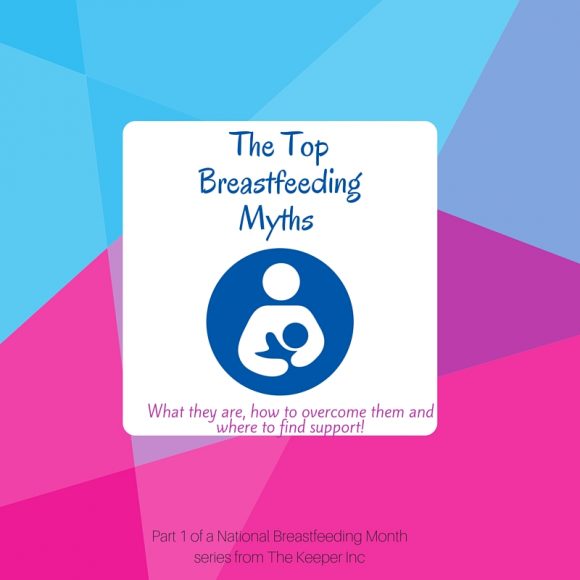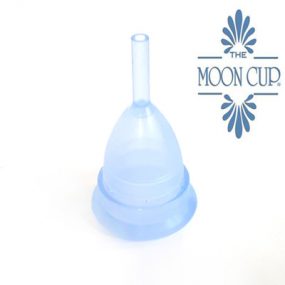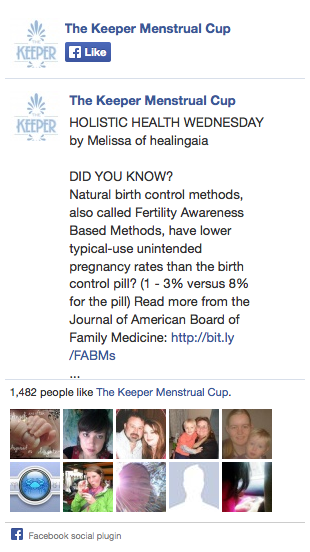August is National Breastfeeding Month with the first week known as “World Breastfeeding Week.” I decided to do a mini-series on breastfeeding this month to look at myths, benefits and what to expect from your period while nursing. This month is full of activities, sales and events focused around breastfeeding. (There are also lots of freebies during this time so check with some of your favorite breastfeeding-related brands!!)
Even if you’re not breastfeeding, I hope you’ll enjoy this series and learn from it to help support nursing Mamas in your life or your own future-nursing journey.
We’ve likely all heard the phrase “Breast is Best” and heard breastfeeding-related stories. There are, unfortunately, myths surrounding breastfeeding and I hope to help clear some of those up. Sometimes lactation consultants refer to these myths as “boobie traps”- this means misinformation which often ends up making a mother feel like she can’t or shouldn’t breastfeed.
I think it’s best to share a bit of my own nursing journey as I dealt with a number of these myself. My son was born in October of 2010 and I knew before I became pregnant I wanted to breastfeed. I knew there were a number of health benefits as well as financial benefits (free food!). What I didn’t know was how little I knew about breastfeeding. I took a couple classes and started learning more when I was pregnant but it wasn’t until after my son was born that the real journey began. We had a bit of a rough start but overcame the myths and ended up having a successful long-term breastfeeding relationship well in to toddlerhood. I ended up working at a locally owned green/breastfeeding focused baby boutique and getting lots of training helping moms with breastfeeding related issues, became involved in the La Leche League and had the honor of helping many new Mamas find success nursing.
It is my hope that by sharing these myths I can help you, or a loved one, find success without as much of a struggle as I went through! There are LOTS of myths out there, I’m going to cover the top few. I also hope that if you are a formula-feeding Mom you’ll feel no judgment. The number one rule is to feed baby and every family needs to do what is best for them, their family, and their lifestyle!
Unfortunately, lots of doctors and nurses (even working in hospitals with newborns) have old and outdated information on breastfeeding. Many times it is outdated information from healthcare professionals that have the most harm to a breastfeeding relationship. Seek a second opinion, reach out to a local La Leche League Leader and/or an IBCLC.
Myth– Breastfeeding is easy/ intuitive (similar myth- breastfeeding should hurt/ nipples should bleed)
Truth– Unfortunately this is not the case. Breastfeeding does not come naturally to a lot of women (or babies) and there is a definite learning curve for both of you. I have a friend who just had her 4th baby and encountered new breastfeeding-related challenges. Nursing should never hurt or lead to bleeding. Never be afraid or embarrassed to reach out for help because you think you *should* know how to nurse intuitively. Like any new skill, it takes practice for both of you. KellyMom provides lots more information and encouragement in this great post.
Myth– Women with small breasts can’t nurse (similar myths- women who have had breast surgery can’t nurse, women who have breasts that don’t grow a lot during pregnancy can’t nurse, women with breasts that don’t become engorged can’t nurse )
Truth– Size does NOT matter. In fact, women with smaller breasts usually have an easier time getting the baby to successfully latch on but big or small (or even mico-sized like mine!), Mamas breasts will make milk! Something one of my lactation consultant friends used to say was “Your body was able to grow this baby for 9 months, trust that it can feed the baby too!”
Myth– C-Section Mamas can’t nurse
Truth– A C-Section Mama might have a bit more of a difficult time initially but she can successfully breastfeed. My son was an emergency c-section and the medications they gave me made me (and my son) groggy so it made things rough to start but with a lot of support we were able to nurse. Mothers who have had a c-section may need help finding more comfortable positions to nurse (laying down works especially well). Kelly Mom provides more information on nursing after a c-section (as well as other surgeries). There are also comprehensive guides available about all medications and if they are nursing friendly.
Myth– Adoptive Mamas can’t nurse
Truth– You can nurse a baby that you didn’t give birth to (check out lots more information from the LLL here!). There are a number of protocols available to induce lactation without being pregnant. I worked for an adoption agency for a while and we were able to help several adoptive Mamas breastfeed. It is a bit more difficult to exclusively breastfeed but through donor milk (or a wet nurse) you can provide an adoptive baby exclusively with breastmilk and can produce some on your own! There are also special nursing tubes that can be filled with milk and attached to the breast so the baby is able to get formula or breastmilk at the breast.
Myth– Nursing too often hurts your supply. (similar myths: Breastfeeding should be scheduled, babies should only spend X amount of time on the breast, a baby should nurse for x amount of time per breast, babies should only nurse x times per day, nursing on demand is bad)
Truth– Breastfeeding is a supply and demand process. If a Mama follows the baby’s cues and not the clock she can establish a healthy milk supply. Nursing whenever the baby is hungry or needs comfort won’t hurt supply.
Myth– Breastmilk loses nutritional benefit after a certain time (ages given are usually 6 months/ 1 year/ 2 years)
Truth– Breastmilk is one of the most nutritious substances on Earth. Each Mother’s milk is able to change and adapt daily based on the needs of the baby and any illnesses the baby or mother have been exposed to. During nursing, the baby’s body communicates with the Mama to get exactly what the baby needs! Many other countries breastfeed for 4+ years and the benefits continue for baby! Check out more info from The Daily Mom.
Myth– A pump is an accurate way to gauge how much milk a mother is producing
Truth– A pump does not remove milk the same way a baby does, it is MUCH less effective. Many women’s bodies do not respond to a pump and the process of pumping can make them feel extremely stressed (which causes less milk to be released). All pumping does is tell a mother how much milk she’s able to pump. I knew a Mama who was engorged and constantly leaking milk who had a pediatrician tell her she had a supply problem because she couldn’t pump 4oz. Many women have more luck with hand expression than a pump. It’s a bit more work but generally much more effective, especially for the colostrum (the first milk produced after birth). If you’re concerned about your supply visit with an IBCLC, LLL leader or other trusted nursing advocate and check out this information from Kelly Mom.
I hope this helps clear up some of the common breastfeeding myths and misconceptions out there. Feel free to reach out via the comments or email to blog@keeper.com with any other questions or concerns (and never feel afraid or embarrassed to reach out to someone locally for help!) Here at Keeper we love to see women supporting and helping other women at all stages in our journeys <3
~ Please be aware I am not a medical doctor, these statements are educational and should not be viewed as medical advice.
ABOUT THE AUTHOR:
Olivia lives in Boulder, Colorado with her husband and 5-year-old son. She enjoys spending time in the mountains, studying about essential oils, natural remedies and herbs, as well as upcycling/ DIY projects. Olivia’s family is almost completely Zero Waste and strives to live with as little impact on the Earth as possible. They are currently downsizing and planning to move into a Tiny House in 2016.

















